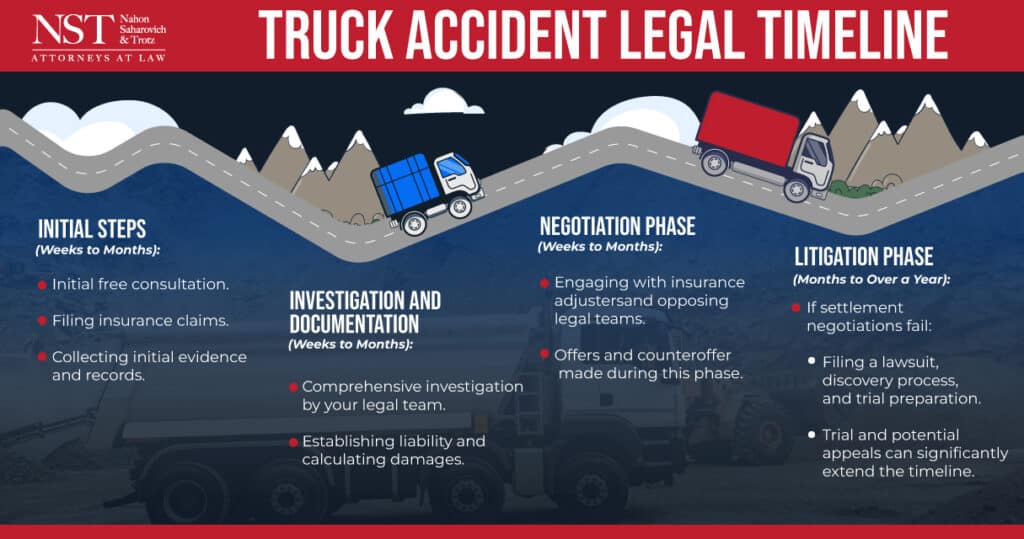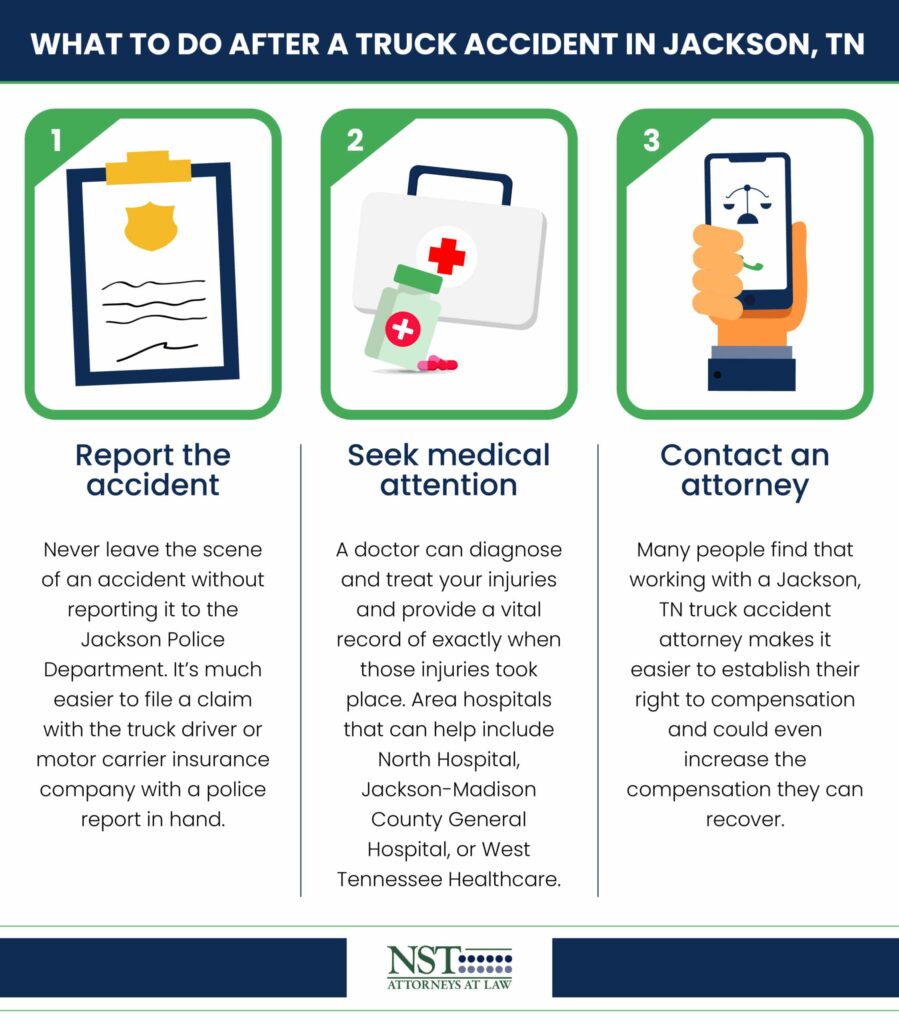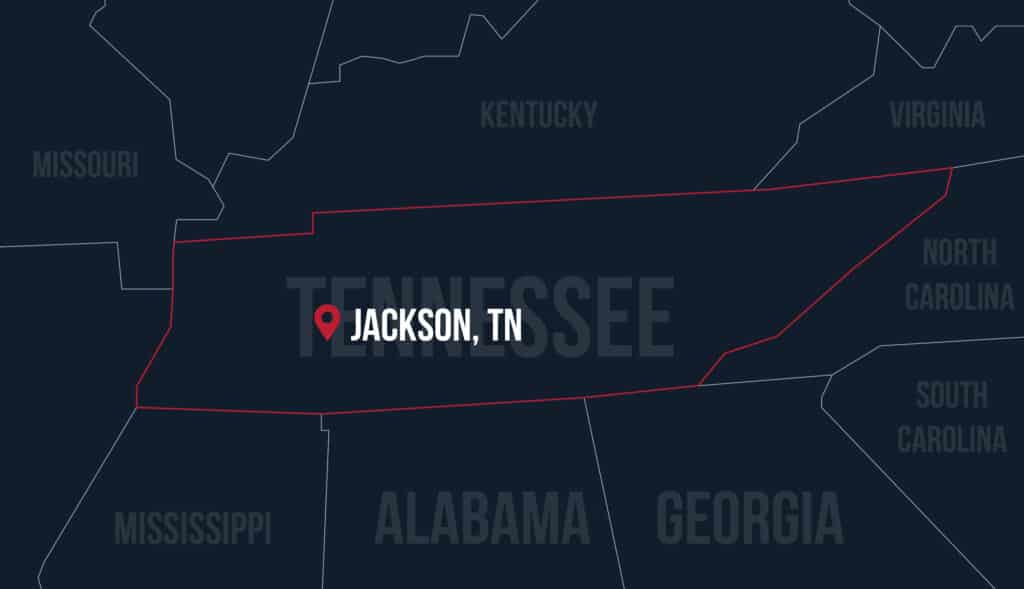FREE 24/7 CONSULTATION | FREE UNLESS YOU WIN “CALL THE CHAMPS!"
 Skip to content
Skip to content


At NST Law, we are dedicated to helping injured individuals and their families get the justice and compensation they deserve.


Expertise
Mr. Trotz has handled injury cases involving auto accidents, slip and fall, premises liability, and negligent security. Every day, Mr. Trotz represents those who have been injured and many of his clients have sustained traumatic and life-altering injuries.
I-40 is a major trucking corridor that runs right through Jackson, TN, and an area of many serious truck accidents each year. Truck accidents can occur for various reasons: speeding, driver fatigue or intoxication, and even driver distraction. Furthermore, some accidents are the result of poor vehicle maintenance or failed standards of duty.
If you have suffered injuries in a truck accident in Jackson, TN, a personal injury lawyer can help you take the next steps to pursue a claim for compensation.
At NST Law, we have successfully helped many truck accident victims in Jackson, TN recover much-needed compensation following severe truck accidents. Over the past 30 years, we have helped our clients recover more than $2 billion in verdicts, settlements, and judgments. That includes:
We have helped many victims of motorcycle accidents, motor vehicle accidents, and tractor-trailer accidents pursue the compensation they deserve for severe injuries. Our team of experienced attorneys will start with a free consultation to go over your claim and give you a better idea of what to expect from your lawsuit. Once hired, we explore the evidence related to your accident and build your case from the ground up. We help provide comprehensive legal advice and aggressively represent our clients to maximize the compensation they can recover from their truck accident claims.

I had a car accident last year, I filed suit and NST got me what I deserved.. Staff was very friendly they touched base about my case periodically… I would recommend them anytime… Thanks NST!! JOB WELL DONE…
Truck accidents are often severe, and even minor collisions can cause serious injuries due to the sheer size and weight differences between a commercial truck and a passenger vehicle. If you do suffer injuries in a truck accident, there are three important steps to follow.
Never leave the scene of an accident without reporting it to the police. The Jackson Police Department may respond to the accident scene, collect evidence and witness statements, and create a police report that will help establish liability for the accident. It’s much easier to file a claim with the truck driver or motor carrier insurance company with a police report in hand.
Even if you do not think you sustained severe injuries, if your truck collision involved considerable property damage, you should consider seeking medical care. A doctor can diagnose and treat your injuries and provide a vital record of exactly when those injuries took place. The documentation of your injuries and medical care could prove vital to your personal injury claim. Area hospitals that can help include North Hospital, Jackson-Madison County General Hospital, or West Tennessee Healthcare.
After a truck accident, you might not know how much compensation to expect, which could leave you to accept a low settlement offer. Many people find that working with a Jackson, TN personal accident attorney makes it easier to establish their right to compensation and could even increase the compensation they can recover.

Tennessee has a comparative fault policy when it comes to car accidents. If you caused less than 50% of the accident, you have the right to pursue compensation even if you contributed to it. However, the compensation you recover may be reduced by the percentage liability you bear. For example, if you are 25% responsible for the accident, you can generally recover 75% of the financial damages you sustained during the accident.
Ultimately, the truck driver who caused the accident bears liability for his decisions behind the wheel, including driving while distracted or speeding, which contributes to a high percentage of truck accidents. However, commercial truck accidents may involve considerable investigation to determine other parties that bear liability, including:
To establish liability for a truck collision, Tennessee personal injury law requires you to prove negligence on the part of the party that caused the accident. Negligence could look like anything from checking a text message to failing to adequately maintain the truck so that it would remain safe on the road. An injury attorney can help truck accident victims in Jackson and throughout Madison County and Maury County identify and name all negligent parties in their truck accident claim.

According to Tennessee Code section 28-3-104, victims of a car accident have one year from the date of the accident to pursue financial compensation for the injuries they sustained, including their medical bills and lost wages. The statute of limitations includes the victims of serious truck accidents.
However, that does not mean that Tennessee drivers should wait to file a personal injury claim. If you have suffered injuries in a trucking accident, you may want to contact a truck accident lawyer in Jackson as soon as you can. A truck accident attorney can help collect evidence related to your accident, meet the statute of limitations, and fight for the maximum compensation possible.
In general, truck accident victims in Tennessee may be eligible for a range of damages for several different types of losses, including:
At NST Law, we help our clients take an in-depth look at the compensation they may deserve and give them a better idea of what they should expect as they move forward with their claim.
Do you need to pursue compensation for injuries sustained in a Jackson, TN truck accident? Contact us today for more information about how we can help.
You may also be interested in:
Founding Member – Senior Partner
Phone: (731) 427-5550
Attorney
Phone: (731) 427-5550
Attorney
Phone: (731) 427-5550
Founding Member – Senior Partner
Phone: (731) 427-5550
Attorney
Phone: (731) 427-5550
Attorney
Phone: (731) 427-5550
Founding Member – Senior Partner
Phone: (731) 427-5550
Attorney
Phone: (731) 427-5550
Attorney
Phone: (731) 427-5550
Founding Member – Senior Partner
Phone: (731) 427-5550
Attorney
Phone: (865) 684-1000
Attorney
Phone: (731) 427-5550
Attorney
Phone: (731) 427-5550
Attorney
Phone: (731) 427-5550
Attorney
Phone: (731) 427-5550
Attorney
Phone: (731) 427-5550
Attorney
Phone: (865) 684-1000
Attorney
Phone: (731) 427-5550
Attorney
Phone: (731) 427-5550
Attorney
Phone: (731) 427-5550
Attorney
Phone: (731) 427-5550
Attorney
Phone: (731) 427-5550
Attorney
Phone: (731) 427-5550
Attorney
Phone: (731) 427-5550
Attorney
Phone: (731) 427-5550
Attorney
Phone: (731) 427-5550


Contact us for a free consultation now so that we can review your case and decide how we can best help you.
